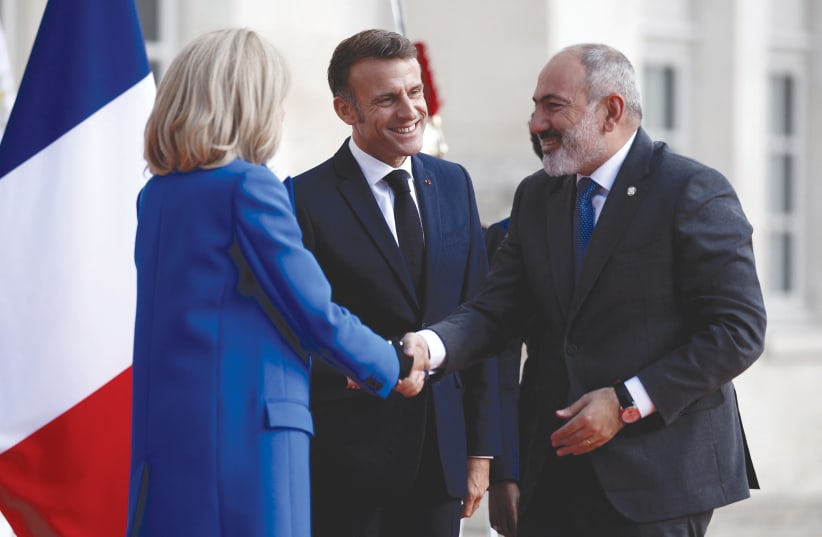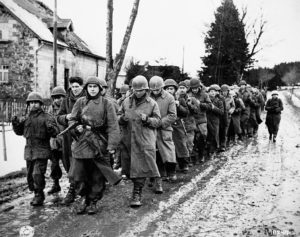Diplomatic posts from French ambassador highlight growing Paris-Tehran ties amid regional tensions.
DECEMBER 5, 2024 03:44

French Ambassador to Armenia Olivier Decottignies recently published two social media posts about the Blue Mosque in Yerevan, where he wrote the following caption: “In the gardens of the Blue Mosque of Yerevan, emblematic of Armenia’s Persian heritage.” The second photo is even more absurd. The diplomat copied an illustration of a map of Iran with the province of West Azerbaijan highlighted in red, proclaiming: “One of the 31 provinces of Iran, whose capital and largest city is Urmia.”
The Azerbaijanis are outraged by these social media posts, as the Blue Mosque in Yerevan was built by Azerbaijanis, and trying to portray the mosque as “Persian” demonstrates France’s support for Persian colonialism in the region.
Furthermore, the Azerbaijanis are angered at the French diplomat’s attempt to portray West Azerbaijan as part of Iran.
In the 1980s, present-day Armenia had a sizable population of over 250,000 ethnic Azerbaijanis, who were forcefully expelled from the region between 1987 and 1988. Following their deportation, the Armenians did everything in their power to erase all traces of Azerbaijani heritage from their country.

Expansion in the South Caucasus
One of these efforts was to refer to historic Azerbaijani mosques, such as the Blue Mosque in Yerevan, as “Persian” mosques. Armenia did this because it enjoys a positive relationship with Iran but is in open conflict with Azerbaijan.
The Persians gladly accepted these efforts and used these Armenian acts of delegitimization in order to expand their colonial influence into the South Caucasus. The French diplomat not only highlighted this in his posts but expanded upon it by denying the Azerbaijani connection to Urmia, the largest city in the West Azerbaijan province of Iran and its capital city.
In the eyes of many, these social media posts highlight France’s open support for Persian hegemony in the region, in violation of the West’s interest to fight against the pro-Iranian axis, which presently spreads from Tehran to Lebanon, Gaza, Syria, Iraq, and Yemen. It is critical to recall that French President Emmanuel Macron called for Western countries to stop delivering weapons to Israel, two days before the anniversary of the October 7 terror attacks.
The fact that Macron is an open critic of Israel while at the same time deploying an ambassador who so openly posts on social media in favor of Tehran makes one pause to ponder – where do Paris’s interests truly lie?
“Just as Iran supports all parts of the Iranian terror axis, so are Israel’s friends expected to support Israel and not impose restrictions that will only strengthen the Iranian axis of evil,” Netanyahu told Macron about a month ago.
However, in May, France banned Israel from participating in Eurosatory, an international arms show held outside of Paris. A French court overturned that decision, but the legal ruling did not come in time for Israeli companies to participate in the exhibition. This, together with Decottignies’s social media posts, shows where France’s sympathies truly lie.
Stay updated with the latest news!
Subscribe to The Jerusalem Post Newsletter
This comes amid Moscow’s diminishing influence in Armenia, a gap that is increasingly being filled by Iran, thus enabling Persian hegemony to expand in the region while Hezbollah is losing ground in Lebanon and Hamas is suffering severe losses in Gaza. Tehran moving into Yerevan to replace the Russian influence over Armenia has enabled the Iranian axis to stand strong against Western-imposed sanctions despite the defeats they suffered in Gaza and Lebanon.
For this reason, France’s support for Persian hegemony in Armenia further aids the Iranian axis at a time when everyone in Israel seeks to see Iran’s influence get weaker; this is bad news from an Israeli standpoint.
The time has come for Paris to stand firm against Tehran, rather than aiding and abetting Israel’s enemies in Iran and their proxies, Hezbollah, Hamas, the Islamic Jihad, and the Houthis.
The writer is a Middle East scholar and commentator on the region.
Source: https://www.jpost.com/opinion/article-832047?utm_source=jpost.app.apple&utm_medium=share




